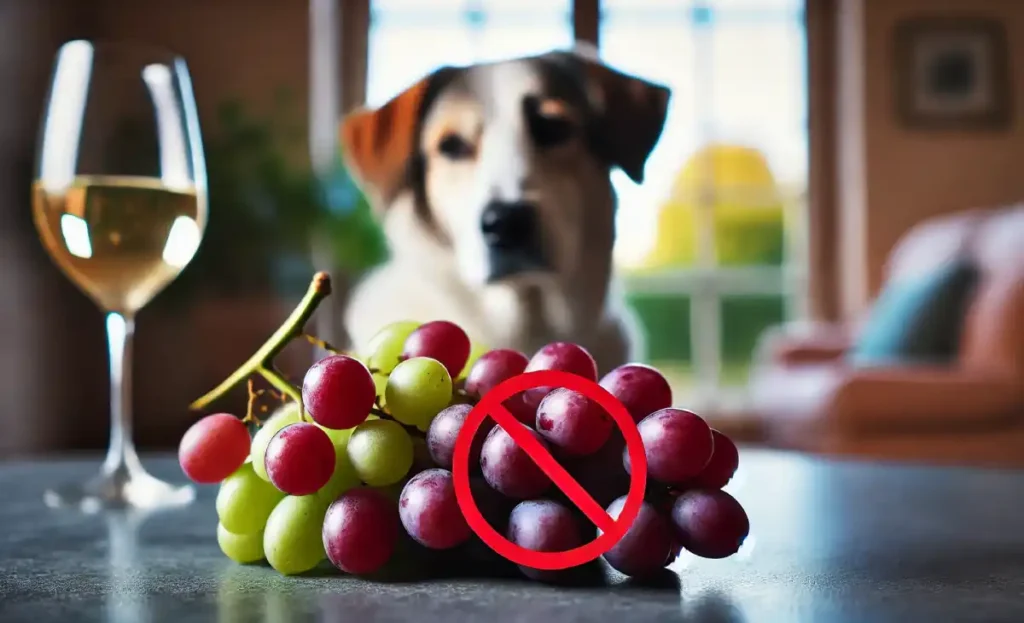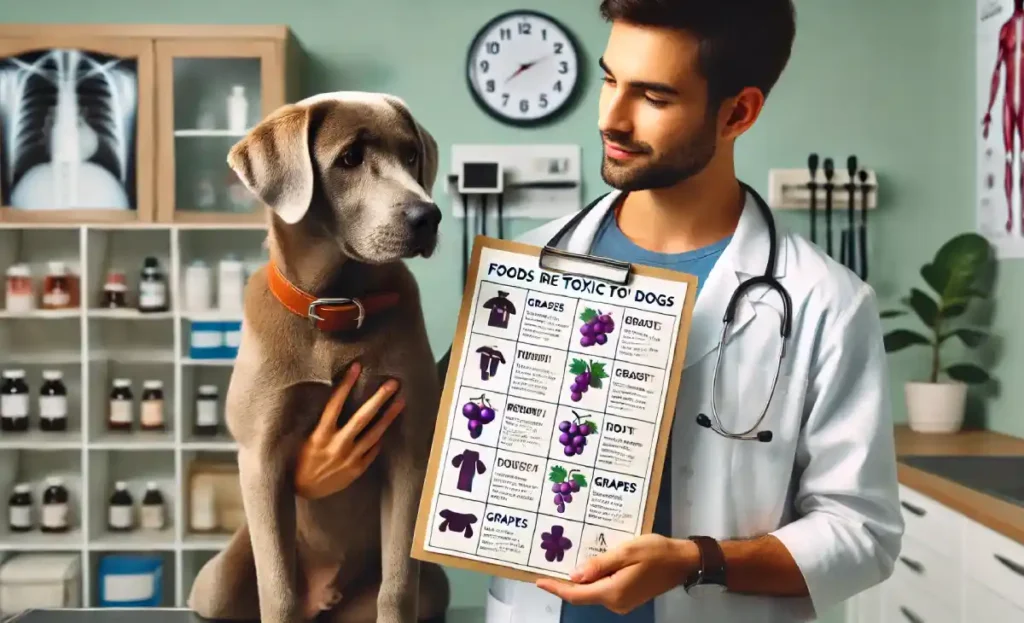As a dog owner, you want to give your pet the best care possible. But when it comes to feeding your dog human food, not everything that’s safe for us is safe for them. One common food that causes confusion is grapes. So, can dogs eat grapes? The short and simple answer is no.
Grapes are incredibly harmful to dogs and can cause life-threatening conditions, even if consumed in small quantities. Whether you’re a new pet owner or someone who’s had dogs for years, it’s important to understand why grapes are dangerous and what to do if your dog accidentally eats them.
Are Grapes Safe for Dogs?
No, grapes are not safe for dogs under any circumstances. Grapes, along with raisins, can lead to severe kidney damage in dogs, a condition that veterinarians refer to as acute kidney failure. This means the kidneys stop working properly, which can quickly become fatal if not treated immediately.
The exact reason why grapes are so toxic to dogs remains a mystery. Researchers have yet to identify the specific substance in grapes that triggers this harmful reaction. What is known, however, is that the effects can vary depending on the dog’s size, breed, and overall health.
Some dogs may experience severe symptoms after consuming just one grape, while others may need to consume a larger quantity to show signs of poisoning. Regardless, it’s best not to take any chances—avoid giving your dog grapes or any food that contains grapes, such as raisin bread, granola, or trail mix.
What Makes Grapes Harmful to Dogs?
Although scientists have not identified the exact compound responsible for grape toxicity in dogs, there are several known risk factors. Grapes contain high levels of sugar and compounds that affect kidney function. When dogs eat grapes, it can trigger a chain reaction that leads to severe kidney damage. This damage prevents the kidneys from filtering toxins from the bloodstream, which can quickly lead to a buildup of dangerous substances in the dog’s body. Over time, this can cause serious illness and even death.
It’s also important to note that both grapes and raisins—which are dried grapes—pose the same level of risk to dogs. So, whether fresh or dried, you should always keep grapes and raisins far away from your dog.
Why Are Grapes Harmful to Dogs?

The danger of grapes comes from their mysterious ability to damage a dog’s kidneys. While humans can enjoy grapes as a healthy snack, dogs lack the ability to process them safely. Acute kidney failure is the primary concern when a dog eats grapes. This condition is a sudden shutdown of the kidneys’ ability to filter waste products from the blood. Without functioning kidneys, a dog’s health can decline rapidly, and the situation can become life-threatening.
Kidney failure is dangerous because the kidneys serve a critical role in the body—removing waste and maintaining the balance of fluids and electrolytes. When the kidneys shut down, waste products build up in the bloodstream, leading to further complications like dehydration, abnormal heart rhythms, and even coma. Even with immediate medical attention, the damage caused by grapes may be irreversible, leading to long-term kidney disease or death.
Symptoms of Grape Poisoning in Dogs
If your dog has eaten grapes, you’ll want to watch for the signs of poisoning. Symptoms might not show up immediately, but within a few hours to a couple of days, certain symptoms will likely appear. The earlier you can recognize these signs, the better chance you have of getting your dog the help it needs.
Common Symptoms of Grape Poisoning:
Here are some common signs that your dog may have grape poisoning:
- Vomiting: This is often the first sign and can occur within hours of eating grapes.
- Diarrhea: Loose stools may contain pieces of grapes or raisins.
- Lethargy: Your dog may become unusually tired and less active.
- Loss of Appetite: Refusing to eat or showing disinterest in food.
- Abdominal Pain: Your dog may show discomfort by whining or lying in unusual positions.
- Dehydration: Signs of dehydration include excessive panting, dry nose, and pale gums.
- Increased Thirst or Urination: Your dog might drink more water than usual but still act dehydrated.
What to Do if Your Dog Eats Grapes

If you suspect or know that your dog has eaten grapes, you need to take immediate action. Time is crucial in preventing the worst outcomes, so it’s essential not to wait for symptoms to develop before seeking help.
Immediate Steps to Take:
1. Contact Your Veterinarian Right Away: The first thing you should do is call your veterinarian or a local emergency animal clinic. Provide them with details such as how many grapes were eaten, your dog’s size, and any symptoms your dog is showing.
2. Follow the Vet’s Instructions: Your vet might ask you to bring your dog in immediately. In some cases, they might advise you to induce vomiting at home to prevent the grapes from being absorbed. However, never try this unless your vet explicitly advises you to do so.
3. Go to the Vet for Treatment: Once at the vet’s office, they will likely administer treatment to prevent or minimize kidney damage. This might include:
- Induced Vomiting: To remove the grapes from your dog’s stomach.
- Activated Charcoal: This can help bind the toxins in the stomach and prevent them from entering the bloodstream.
- Intravenous Fluids: Fluid therapy helps flush out toxins and supports the kidneys.
Even if your dog seems fine at first, the effects of grape poisoning can take time to develop, so early treatment is crucial.
Can Dogs Eat Other Fruits?
While grapes are toxic, other fruits can be perfectly safe and even beneficial for dogs. Here’s a quick overview of what fruits are safe and which ones should be avoided.
Safe Fruits for Dogs:
- Apples (without seeds): Apples are a good source of fiber and vitamins for dogs.
- Blueberries: These small berries are packed with antioxidants and are safe for dogs in moderation.
- Bananas: Rich in potassium, bananas can be a healthy treat for dogs.
- Watermelon (without seeds): Watermelon is hydrating and safe, but make sure to remove the seeds.
Unsafe Fruits for Dogs:
- Grapes and Raisins: As discussed, grapes are toxic and should always be avoided.
- Cherries: While the flesh is safe, the pit contains cyanide, which can be dangerous if consumed.
- Avocados: Avocados contain persin, which is toxic to dogs.
- Citrus Fruits (like lemons or limes): These fruits can cause digestive upset and irritation for dogs.
Always consult with your vet before introducing a new fruit into your dog’s diet to ensure it’s safe.
FAQs
What should I do if my dog eats a grape?
If your dog eats a grape, call your vet right away. Don’t wait for symptoms to appear, as early treatment can prevent serious complications like kidney failure.
Can dogs eat raisins instead of grapes?
No, raisins are just as dangerous as grapes. Both can cause kidney failure in dogs, so avoid giving your dog any food containing raisins.
Why are grapes harmful to dogs but not humans?
While humans can eat grapes without any problem, dogs’ bodies process food differently. The exact reason is still unknown, but grapes contain compounds that can trigger kidney failure in dogs.
Can one grape hurt my dog?
Yes, even one grape can be dangerous. Some dogs have severe reactions to a single grape, while others may tolerate more before showing symptoms. Regardless, it’s best not to risk it.
Final Words
To keep your dog safe, it’s vital to know that grapes and raisins are extremely dangerous. They can cause acute kidney failure, which can be fatal if not treated right away. Whether it’s a single grape or a handful of raisins, no amount is safe for dogs. If you suspect your dog has eaten grapes, contact your vet immediately. By staying informed and vigilant, you can protect your dog from harmful foods and ensure a long, healthy life.
For more in-depth information on grape toxicity in dogs, visit PetMD’s guide on toxic foods.




